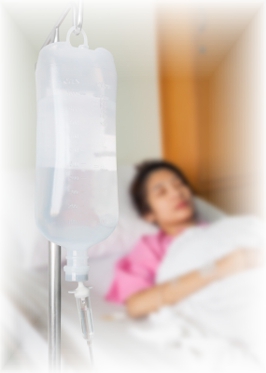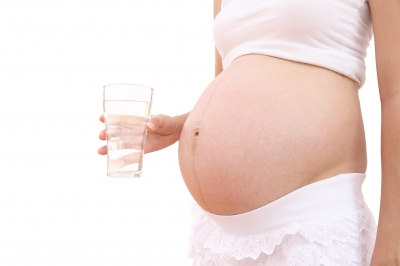
|
|

|
|
|
Weekly Tip...
-
This week's tip
Group Beta Strep
About Group B Strep
 Group B Streptococcus (group B strep) is a type of bacteria that causes illness in people of all ages. Also known as GBS or baby strep, group B strep
disease in newborns most commonly causes sepsis (infection of the blood), pneumonia (infection in the lungs), and sometimes meningitis (infection of
the fluid and lining around the brain).
Group B Streptococcus (group B strep) is a type of bacteria that causes illness in people of all ages. Also known as GBS or baby strep, group B strep
disease in newborns most commonly causes sepsis (infection of the blood), pneumonia (infection in the lungs), and sometimes meningitis (infection of
the fluid and lining around the brain).
There are 2 cornerstones to preventing newborn early-onset disease: testing all pregnant women for group B strep bacteria late in pregnancy, and
giving antibiotics during labor to women who test positive for the bacteria.
1. Testing Pregnant Women
The CDC (Center for Disease Control) guidelines recommend that a pregnant woman be tested, or screened, for group B strep in her vagina and rectum
when she is 35 to 37 weeks pregnant. The test is simple and does not hurt. A sterile swab ("Q-tip") is used to collect a sample from the vagina and
the rectum. This is sent to a laboratory for testing.
About 25% of pregnant women carry group B strep in the rectum or vagina. Those women are considered group B strep positive. A woman may test positive
at certain times and not at others. That's why it's important for all pregnant women to be tested for group B strep between 35 to 37 weeks of every
pregnancy.
Did You Know?
A pregnant woman who tests positive for group B strep and gets antibiotics during labor can feel confident knowing that she has only a 1 in 4,000
chance of delivering a baby with group B strep disease. If a pregnant woman who tests positive for group B strep does not get antibiotics at the time
of labor, her baby has a 1 in 200 chance of developing group B strep disease. This means that those infants whose mothers are group B strep positive
and do not get antibiotics have over 20 times the risk of developing disease than those who do receive preventive antibiotics.
2. Antibiotics During Labor
To help protect their babies from infection, pregnant women who test positive for group B strep in the current pregnancy should receive antibiotics
(medicine) through the vein (IV) during labor. Also, the CDC guidelines state that pregnant women who have group B strep detected in their urine
during the current pregnancy or who had a previous infant with group B strep disease should receive antibiotics during labor; they do not need to be
screened at 35-37 weeks because they should receive antibiotics regardless of the screening result. Pregnant women who do not know whether or not
they are group B strep positive when labor starts should be given antibiotics if they have:
- labor starting at less than 37 weeks (preterm labor);
- prolonged membrane rupture (water breaking 18 or more hours before delivery); or
- fever during labor.
Antibiotics help to kill some of the group B strep bacteria that are dangerous to the baby during birth. The antibiotics help during labor only - they
can't be taken before labor, because the bacteria can grow back quickly. Penicillin is the most common antibiotic that is given. For women who are
severely allergic to penicillin, there are other antibiotics that can be given.
-
Previous week's tip
Lysteria
Listeriosis and Pregnancy
 Listeriosis is a rare but serious infection caused by eating food contaminated with bacteria called Listeria. Listeriosis mostly affects pregnant
women, newborns, older adults, and people with weakened immune systems. Pregnant women are about 10 times more likely than the general population to
get listeriosis. About 1 in 6 of the patients who are diagnosed with listeriosis are pregnant women.
Listeriosis is a rare but serious infection caused by eating food contaminated with bacteria called Listeria. Listeriosis mostly affects pregnant
women, newborns, older adults, and people with weakened immune systems. Pregnant women are about 10 times more likely than the general population to
get listeriosis. About 1 in 6 of the patients who are diagnosed with listeriosis are pregnant women.
Infected pregnant women may experience fever and other nonspecific symptoms, such as fatigue and aches. The disease can also be very serious for
unborn babies or newborns. Listeriosis during pregnancy can lead to miscarriage, stillbirth, premature delivery, or infection in newborns.
In general, you can protect yourself from listeriosis by avoiding:
- hot dogs and delicatessen meats unless heated or reheated until steaming hot
- raw (unpasteurized) milk.
- soft cheeses unless they are made from pasteurized milk. Be aware that Mexican-style cheeses made from pasteurized milk, such as queso
fresco, likely contaminated during cheese-making, have caused Listeria infections.
- raw or undercooked fish or seafood, such as sushi or sashimi.
- refrigerated pates and meat spreads, and
- refrigerated smoked seafood, unless it has been heated until steaming hot.
Pregnant women and others who are especially susceptible to the disease should take extra precautions not to get fluid from delicatessen meat or hot
dog packages on other foods or food preparation surfaces. Additionally, pregnant women should thoroughly wash their hands after handling delicatessen
meats and hot dogs
If you are pregnant and develop fever and other nonspecific symptoms, such as fatigue and aches, talk to your healthcare provider within 24 hours.
If you are infected, your health care provider can give you antibiotics that can protect your unborn baby or newborn. If a person has eaten food
contaminated with Listeria and does not have any symptoms, most experts believe that no tests or treatment are needed, even for persons at higher
risk for listeriosis.
-
Previous week's tip
Toxoplasmosis
What is Toxoplasmosis?
A single-celled parasite called Toxoplasma gondii causes a disease known as toxoplasmosis. Of the people who are infected, very few have symptoms
because a healthy person's immune system usually keeps the parasite from causing illness. However, pregnant women and individuals who have compromised
immune systems should be cautious; for them, a Toxoplasma infection could cause serious health problems.
How do people get toxoplasmosis?.

- Eating undercooked, contaminated meat (especially pork, lamb, and venison).
- Accidental ingestion of undercooked, contaminated meat after handling it and not washing hands thoroughly (Toxoplasma cannot be absorbed through intact skin)..
- Eating food that was contaminated by knives, utensils, cutting boards and other foods that have had contact with raw, contaminated meat.
- Drinking water contaminated with Toxoplasma gondii.
- Accidentally swallowing the parasite through contact with cat feces that contain Toxoplasma.
If you have a cat, you should follow these helpful tips to reduce your risk of environmental exposure to Toxoplasma.
- Avoid changing cat litter if possible. If no one else can perform the task, wear disposable gloves and wash your hands with soap and warm water afterwards.
- Ensure that the cat litter box is changed daily. The Toxoplasma parasite does not become infectious until 1 to 5 days after it is shed in a cat's feces.
- Feed your cat commercial dry or canned food, not raw or undercooked meats.
- Keep cats indoors.
- Avoid stray cats, especially kittens. Do not get a new cat while you are pregnant.
- Keep outdoor sandboxes covered.
- Wear gloves when gardening and during contact with soil or sand because it might be contaminated with cat feces that contain Toxoplasma.
Wash hands with soap and warm water after gardening or contact with soil or sand.
If you are newly infected with Toxoplasma while you are pregnant, or just before pregnancy, then you can pass the infection on to your baby. You may
not have any symptoms from the infection.
If Most infants who are infected while still in the womb have no symptoms at birth, but they may develop symptoms later in life. A small percentage
of infected newborns have serious eye or brain damage at birth.
Previous week's tip
Bleeding in Pregnancy
When a woman is pregnant, her body produces an extra pint of blood. In order to house this blood, the body makes new vessels and capillaries to
house the blood. These new capillaries in the mucous membranes tend to bleed easily. This may be seen . . . .

- 1. . . . . when you brush your teeth, your gums may bleed.
- 2. . . . . when you may get nose bleeds for no reason. If you do, pinch you nose just below the bridge to stop the bleeding. Do not tip your
head back.
- 3. . . . . when your cervix may bleed when you have intercourse. This may show up as spotting after intercourse or the next morning.
Heavy bleeding, like a period, with or without cramping may be a sign of miscarriage in the first trimester (weeks 1-13) or it may be preterm labor
or another complication during the second or third trimester (weeks 14-40). Your health care provider needs to be notified immediately.
Any bleeding, light or heavy, bright red or brown, should be reported to your health care provider.
Previous weeks' tip
Weight Gain
The normal amount of weight gain in pregnancy is 25-35 pounds. Minimum weight gain is 12 pounds and maximum weight gain is 50 pounds.
It is normal at the beginning of pregnancy to lose a few pounds if you are having nausea and/or vomiting. Once your appetite returns weight gain should be approximately 1 pound per
week.
 Why is it important how much weight you gain?
Why is it important how much weight you gain?
 1. If you gain over 40 pounds, your baby will also gain excessive weight and you may have a difficult birth. Your doctor may schedule a
c-section just because you have gained too much and your baby is now big. 1. If you gain over 40 pounds, your baby will also gain excessive weight and you may have a difficult birth. Your doctor may schedule a
c-section just because you have gained too much and your baby is now big.
 2. Every pound you gain over 35 pounds is excessive and extra weight that you have to get rid of after the baby is born. If you keep your
weight gain to 35 pounds, you will lose it easily (unless you are overeating) after the baby is born, usually in 6 weeks. 2. Every pound you gain over 35 pounds is excessive and extra weight that you have to get rid of after the baby is born. If you keep your
weight gain to 35 pounds, you will lose it easily (unless you are overeating) after the baby is born, usually in 6 weeks.
The most common causes of excessive weight gain are. . . . .
 1. ....... . drinking sugars. Juices (even fresh squeezed), sodas, sweet tea, etc. One small glass of juice in the morning will give you all the
vitamin C you need. The rest of the day drink WATER!!!! 1. ....... . drinking sugars. Juices (even fresh squeezed), sodas, sweet tea, etc. One small glass of juice in the morning will give you all the
vitamin C you need. The rest of the day drink WATER!!!!
 2. ....... .. excessive carbs. This includes rice, pasta, potatoes, breads, cereal, oatmeal, etc. Our biggest problem is not that we eat carbs,
but that we eat too much carbs. A serving of rice, pasta, or potatoes is ˝ cup cooked. Measure the next time you eat and find out how much you have
been eating. One slice of bread is 1 serving. A bagel is 3-4 servings (that’s all the carbs you need for the whole day!) The next time you reach
for the cereal box, look and see what a serving is. It is usually 1/4 to 1 cup. Measure it out! 2. ....... .. excessive carbs. This includes rice, pasta, potatoes, breads, cereal, oatmeal, etc. Our biggest problem is not that we eat carbs,
but that we eat too much carbs. A serving of rice, pasta, or potatoes is ˝ cup cooked. Measure the next time you eat and find out how much you have
been eating. One slice of bread is 1 serving. A bagel is 3-4 servings (that’s all the carbs you need for the whole day!) The next time you reach
for the cereal box, look and see what a serving is. It is usually 1/4 to 1 cup. Measure it out!
If you are gaining too fast, reduce your carb intake to 4 servings per day. If you have gained over 35 pounds, eliminate carbs from your diet all
together. Below is the diet we put our moms on if they have gained too much weight.
Restricted Intake Diet
| breakfast |
2-3 eggs with cheese or veggies. Herbal tea |
| Morning Snack |
carrots, cucumbers, celery |
| Lunch |
Huge mixed salad with either tuna, cheese, chicken, meat, nuts, or a combination of these. (salad dressing oil & vinegar) |
| Afternoon Snack |
piece of fruit (apple, orange, grapefruit) with your choice of 1/2 cup of cottage cheese, 1 ounce of cheese, or peanut
butter with your apple. |
| Dinner (before 7 pm) |
Meat (as much as you like) 2 veggies and/or a dinner salad (no rice, potatoes, or pasta) |
| Evening Snack |
Protein shake made with milk |
NO JUICES, BREAD, CANDIES, CAKE, ETC!
Previous weeks' tip
Exercise
As a general rule, if you are in good health, you can continue doing any exercise that you currently do. If you run every day, continue until your body doesn't let you. Listen to your own body in all things. Don't push yourself to do anything that causes pain or overexertion. If you do aerobics or work out at a gym, make sure it is a program for pregnancy.

This is not the time to start a new activity or exercise routine, but you can continue whatever you currently do.
- NO - high-impact aerobics (kick boxing, etc.)
- NO - inversions, if you do yoga (this may cause breech position)
Walking is always recommended during pregnancy whether you currently do it or not. It will help prevent swelling, varicose veins, constipation, and excessive weight gain. It is recommended that you take a “brisk” 30 minute walk at least 3 times a week, daily if you can.
Previous weeks' tip
Protein

During pregnancy a woman has an increased need for protein. An adult male needs 40-50 grams of protein daily for good health. A pregnant woman
needs 70-100 grams of protein daily. This works out to 6 servings daily.
The baby grows on protein and he/she is making new cells every day, therefore the need for increased protein when pregnant is necessary.
Where can we get protein?
- 1. meat - well cooked, not raw
- 2. poultry - well cooked, not raw
- 3. fish/seafood - well cooked, not raw
- 4. Dairy - milk, cheese, yogurt, cottage cheese, etc.
- 5. nuts - do not overdo as they are high in fat
- 6. legumes - must be combined with a whole grain to be a complete protein
- 7. eggs - hard boil a dozen and keep in the fridge for snacks
Have a protein at each meal and then make your snacks a serving of protein - nuts, peanut butter with apple or celery, hard-boiled eggs, yogurt,
cheese and crackers, etc. Finish the day with a protein shake before going to bed to give you and the baby something to feed on during the night.
Below is our recipe for a protein shake:
- 1- Frozen banana (be sure to peel the banana before you freeze it in a ziplock bag
- 1-cup milk (may use almond or soy milk)
- 1-scoop (2 Tablespoons) protein powder. Any simple protein powder will do.
Combine all in a blender and blend until smooth. You may add ice to thicken or fruit to flavor.
Previous weeks' tip
Water
 Summer is a time when everyone needs to be aware of becoming dehydrated. For a pregnant woman dehydration is a concern whether it is summer or winter
Summer is a time when everyone needs to be aware of becoming dehydrated. For a pregnant woman dehydration is a concern whether it is summer or winter
A pregnant woman needs to drink 1 8-oz glass of water daily for every 10 pounds of body weight. That means if she weighs 130 pounds she needs to drink 13 glasses of
water daily. Use the chart below to find how much water you should be drinking.
| Weight |
#of 8-oz glasses |
#of 16 oz bottles |
#of 24 oz bottles |
| 100 |
10 |
5 |
3 |
| 120 |
12 |
6 |
4 |
| 140 |
14 |
7 |
5 |
| 160 |
16 |
8 |
51/2 |
| 180 |
18 |
9 |
6 |
| 200 |
20 |
10 |
7 |
| 220 |
22 |
11 |
71/2 |
| 240 |
24 |
12 |
8 |
Pregnancy causes your body to retain more water for the pregnancy, you are making amniotic fluid for the baby constantly throughout the pregnancy and your baby's
kidneys don't start working until after he/she is born. Therefore, your kidneys must flush for 2 people throughout the pregnancy. It is very important for a
pregnant woman to drink enough water during pregnancy.
Dehydration during pregnancy can cause contractions that could lead to preterm labor.
Previous weeks' tip
Early Pregnancy classes
If you are less than 20 weeks pregnant, please attend the Early Pregnancy Class on July 19th @ 10:00am. You must RSVP at 305-754-2229 to secure a seat as space is limited. Continental breakfast will be served. Bring your questions, issues and concerns and let the discussions begin.

Contact Us | Site Map
|
|
|
|